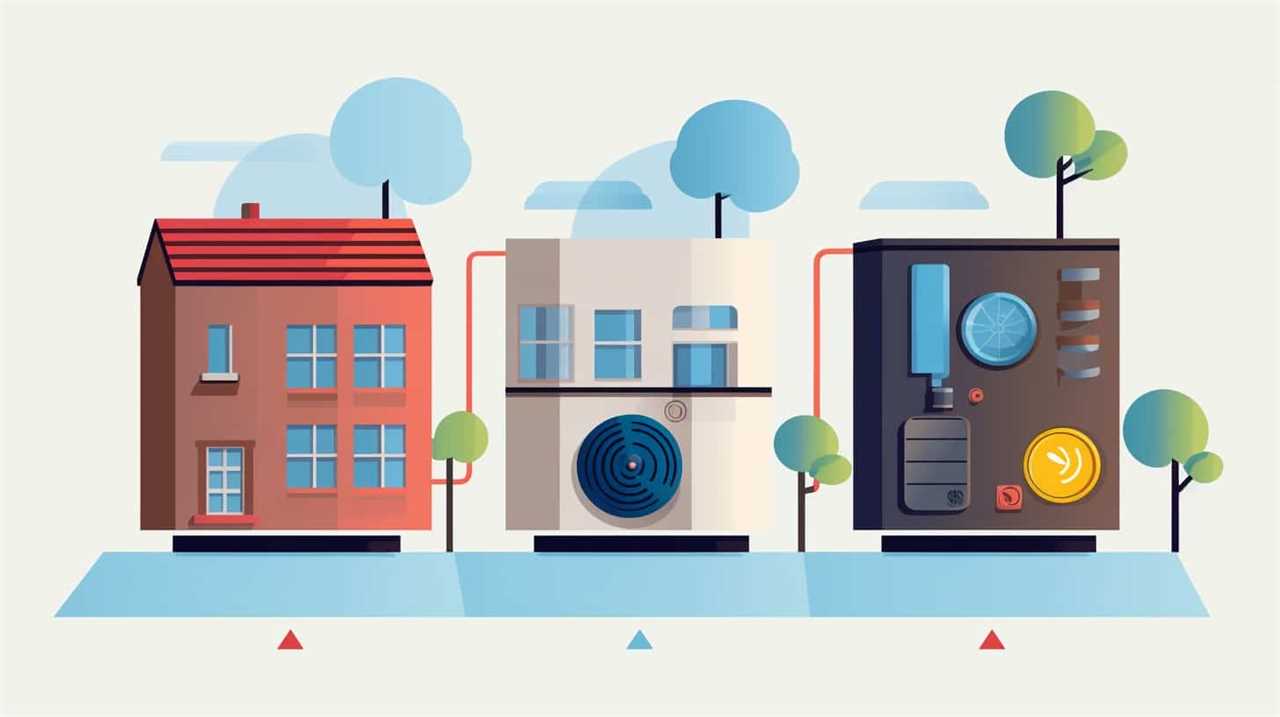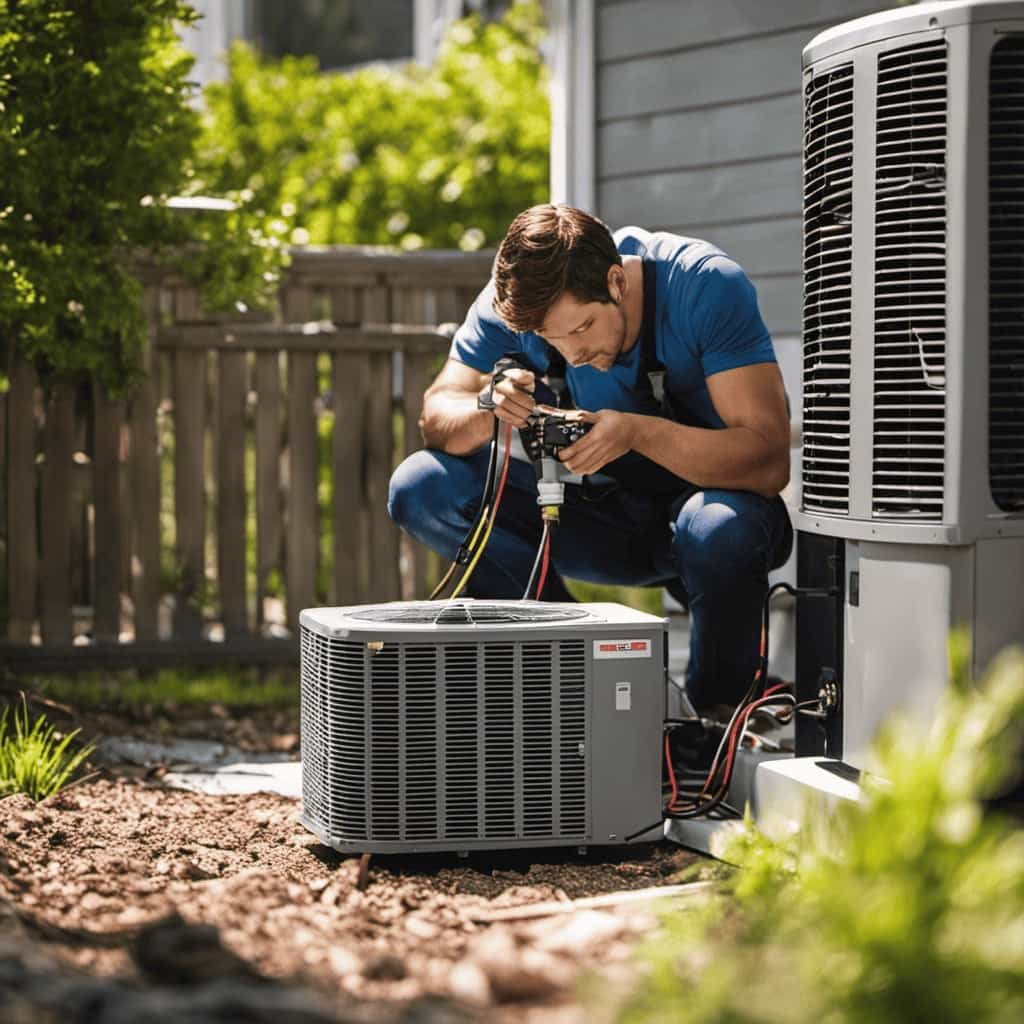We have found something very interesting: sustainable residences with heat pump efficiency are changing the way we live.
These homes not only reduce our carbon footprint, but they also save us a significant amount of money on energy bills.
In this article, we’ll explore the importance of sustainable home design and delve into the key features that make these homes superior.
Join us as we uncover the secrets to maximizing heat pump efficiency in home design and showcase inspiring case studies of successful sustainable homes.

Key Takeaways
- Sustainable home design with heat pump systems can significantly reduce carbon footprint and save on utility costs.
- Heat pumps are more efficient than traditional heating and cooling systems, producing up to three units of heat for every unit of electricity consumed.
- Proper insulation, smart thermostat integration, and strategic placement can maximize heat pump efficiency and reduce energy consumption.
- Heat pump technology is continually advancing and has the potential to integrate with renewable energy sources, making it a promising solution for achieving sustainable and energy-efficient homes.
The Importance of Sustainable Home Design
We believe that sustainable home design is crucial for creating a greener future. When it comes to building or renovating our homes, it’s important to consider the environmental impact.
Using green building materials is an excellent way to reduce our carbon footprint. These materials are made from renewable resources, such as bamboo and recycled materials, and have a lower environmental impact than traditional building materials.
Additionally, incorporating energy efficient appliances into our homes is essential for reducing energy consumption. These appliances are designed to use less energy, which not only helps the environment but also saves us money on utility bills.
Understanding Heat Pump Systems for Energy Efficiency
To achieve optimal energy efficiency, it’s important to understand how heat pump systems work. Here are three key aspects of heat pump functionality that contribute to their energy saving technology:

-
Heat transfer: Heat pumps transfer heat from a cool area to a warm area, using a refrigerant to absorb and release heat energy.
-
Reversible operation: Heat pumps can both heat and cool a space by reversing the flow of refrigerant. In winter, they extract heat from the outdoor air or ground and transfer it indoors. In summer, they remove heat from the indoor air and release it outside.
-
Efficient operation: Heat pumps use electricity to power the refrigeration cycle, making them more efficient than traditional heating and cooling systems. They can produce up to three units of heat for every unit of electricity consumed.
Understanding these fundamental aspects of heat pump systems empowers homeowners to make informed decisions about their energy-saving capabilities.

Key Features of Superior Sustainable Homes
Superior sustainable homes incorporate several key features that enhance energy efficiency and promote environmental sustainability. By incorporating energy efficient appliances and utilizing renewable energy sources, these homes can significantly reduce their carbon footprint and save on utility costs.
| Key Features | Benefits |
|---|---|
| Energy efficient appliances | Lower energy consumption and reduced costs |
| Renewable energy sources | Reduced reliance on fossil fuels |
| Proper insulation and air sealing | Improved comfort and energy efficiency |
Energy efficient appliances, such as ENERGY STAR-certified products, consume less energy while still providing the same level of performance. Incorporating renewable energy sources, such as solar panels or geothermal systems, allows homeowners to generate their own clean energy. Proper insulation and air sealing help to minimize heat loss or gain, resulting in improved comfort and reduced energy consumption.
Maximizing Heat Pump Efficiency in Home Design
By optimizing the placement and sizing of heat pumps, we can significantly increase their efficiency in home design. This not only reduces energy consumption but also lowers utility bills and contributes to a more sustainable lifestyle.
Here are three key ways to maximize heat pump efficiency:

-
Optimizing insulation: Proper insulation helps to minimize heat loss or gain, allowing the heat pump to work more efficiently and maintain a consistent indoor temperature.
-
Smart thermostat integration: By connecting your heat pump to a smart thermostat, you can easily control and program temperature settings based on your schedule and preferences. This ensures that your heat pump only operates when needed, saving energy and maximizing efficiency.
-
Strategic placement: Installing heat pumps in areas that are well-ventilated and away from direct sunlight or heat sources can prevent unnecessary strain on the system, improving its overall performance.
By implementing these strategies, homeowners can optimize their heat pump’s efficiency and create a more sustainable living environment.

Now, let’s explore some case studies of successful sustainable homes with heat pump systems.
Case Studies: Successful Sustainable Homes With Heat Pump Systems
For our case studies, we’ll examine successful sustainable homes that have implemented heat pump systems. These case studies provide real-world examples of how heat pump systems can contribute to energy savings and overall sustainability.
In the first case study, a family in California installed a ground-source heat pump system in their newly constructed home. This system not only provided efficient heating and cooling but also reduced their energy consumption by 30%.
Another case study took place in Vermont, where a couple retrofitted their existing home with an air-source heat pump system. This resulted in a 40% decrease in their energy bills, showcasing the significant energy savings potential of heat pump technology.

These case studies highlight the practicality and effectiveness of heat pump systems in achieving sustainable and efficient homes.
Frequently Asked Questions
How Much Does It Cost to Install a Heat Pump System in a Sustainable Home?
Installing a heat pump system in a sustainable home can vary in cost depending on factors like size and location. However, a cost analysis shows that the energy savings over time make it a worthwhile investment.
Are There Any Government Incentives or Rebates Available for Installing Heat Pump Systems in Sustainable Homes?
Yes, there are government incentives and rebates available for installing heat pump systems in sustainable homes. These incentives aim to promote energy efficiency and reduce carbon emissions, making it more affordable to invest in heat pump technology.
Can a Heat Pump System Be Integrated With Existing Heating and Cooling Systems in a Home?
Yes, a heat pump system can be integrated with existing heating and cooling systems in a home. This integration offers numerous benefits, such as increased energy efficiency and reduced carbon emissions.

Are There Any Maintenance Requirements for Heat Pump Systems in Sustainable Homes?
Maintenance requirements for heat pump systems in sustainable homes are minimal, ensuring long-lasting energy efficiency. Regular filter cleaning and annual professional inspections keep the system running smoothly, allowing us to enjoy superior comfort without worry.
Are There Any Limitations or Drawbacks to Using Heat Pump Systems in Sustainable Homes?
There are some limitations and drawbacks to using heat pump systems in sustainable homes. It’s important to consider factors like climate, energy efficiency, and installation costs before deciding on this option.
Conclusion
In conclusion, sustainable homes with heat pump efficiency are a superior choice for energy-conscious individuals. By understanding the importance of sustainable home design and maximizing heat pump efficiency, homeowners can create a comfortable and eco-friendly living space.
With key features like insulation, solar panels, and efficient appliances, these homes offer a sustainable solution for reducing energy consumption and minimizing carbon footprints. Case studies of successful sustainable homes with heat pump systems demonstrate the effectiveness of this approach.

Choose sustainability and enjoy the benefits of a superior home.









